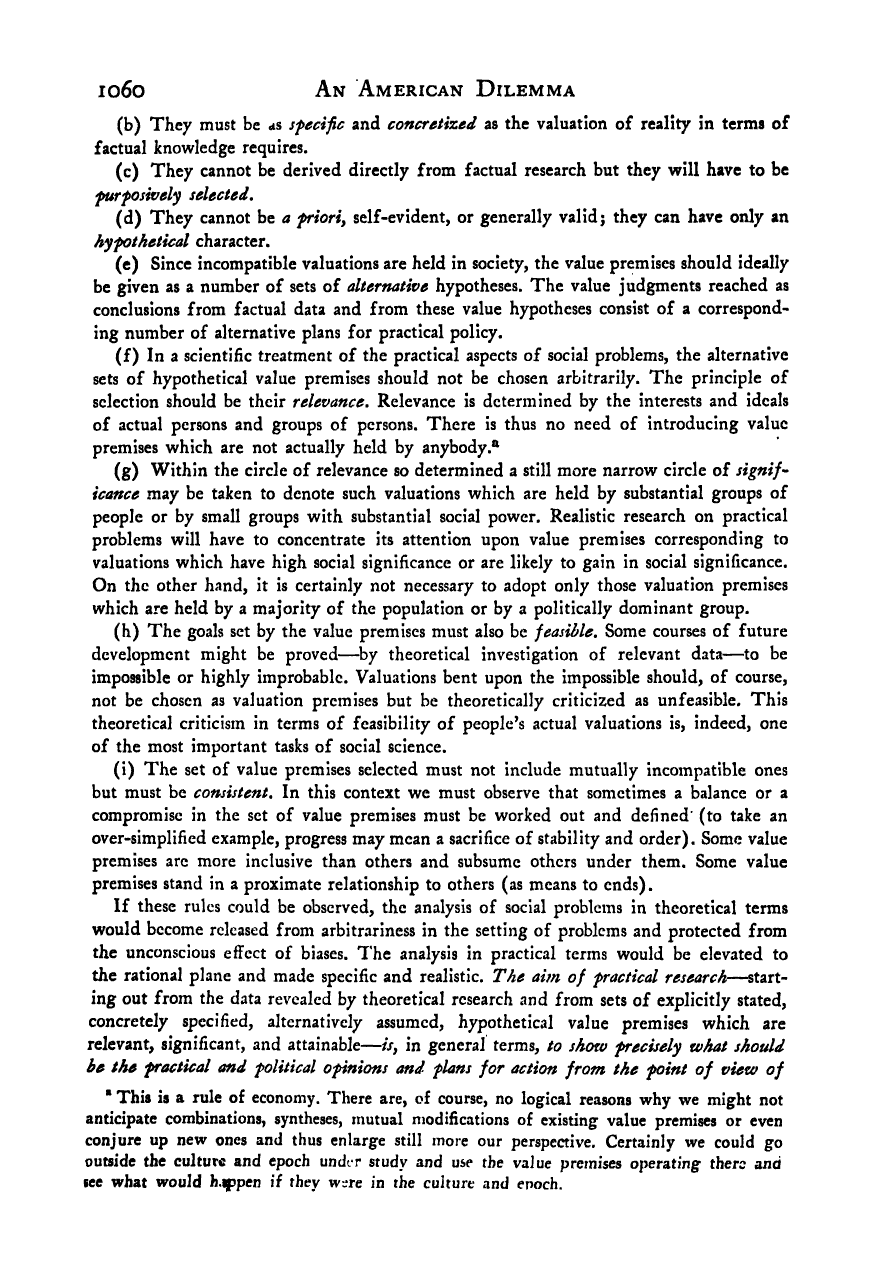Note: Gunnar Myrdal died in 1987, less than 70 years ago. Therefore, this work is protected by copyright, restricting your legal rights to reproduce it. However, you are welcome to view it on screen, as you do now. Read more about copyright.
Full resolution (TIFF) - On this page / på denna sida - Appendices - 2. A Methodological Note on Facts and Valuations in Social Science - 4. The Points of View Adopted in This Book

<< prev. page << föreg. sida << >> nästa sida >> next page >>
Below is the raw OCR text
from the above scanned image.
Do you see an error? Proofread the page now!
Här nedan syns maskintolkade texten från faksimilbilden ovan.
Ser du något fel? Korrekturläs sidan nu!
This page has never been proofread. / Denna sida har aldrig korrekturlästs.
io6o An American Dilemma
(b) They must be as sfecijic and concretized as the valuation of reality in terms of
factual knowledge requires.
(c) They cannot be derived directly from factual research but they will have to be
furfosively selected,
(d) They cannot be a frioriy self-evident, or generally valid; they can have only an
hyfotketical character.
(e) Since incompatible valuations are held in society, the value premises should ideally
be given as a number of sets of alternative hypotheses. The value judgments reached as
conclusions from factual data and from these value hypotheses consist of a correspond-
ing number of alternative plans for practical policy.
(f) In a scientific treatment of the practical aspects of social problems, the alternative
sets of hypothetical value premises should not be chosen arbitrarily. The principle of
selection should be their relevance. Relevance is determined by the interests and ideals
of actual persons and groups of persons. There is thus no need of introducing value
premises which are not actually held by anybody.®
(g) Within the circle of relevance so determined a still more narrow circle of signify-
icance may be taken to denote such valuations which are held by substantial groups of
people or by small groups with substantial social power. Realistic research on practical
problems will have to concentrate its attention upon value premises corresponding to
valuations which have high social significance or are likely to gain in social significance.
On the other hand, it is certainly not necessary to adopt only those valuation premises
which are held by a majority of the population or by a politically dominant group.
(h) The goals set by the value premises must also be feasible. Some courses of future
development might be proved—^by theoretical investigation of relevant data—to be
impossible or highly improbable. Valuations bent upon the impossible should, of course,
not be chosen as valuation premises but be theoretically criticized as unfeasible. This
theoretical criticism in terms of feasibility of people’s actual valuations is, indeed, one
of the most important tasks of social science.
(i) The set of value premises selected must not include mutually incompatible ones
but must be consistent. In this context we must observe that sometimes a balance or a
compromise in the set of value premises must be worked out and defined’ (to take an
over-simplified example, progress may mean a sacrifice of stability and order). Some value
premises arc more inclusive than others and subsume others under them. Some value
premises stand in a proximate relationship to others (as means to ends).
If these rules could be observed, the analysis of social problems in theoretical terms
would become released from arbitrariness in the setting of problems and protected from
the unconscious effect of biases. The analysis in practical terms would be elevated to
the rational plane and made specific and realistic. The aim of fradical research—start-
ing out from the data revealed by theoretical research and from sets of explicitly stated,
concretely specified, alternatively assumed, hypothetical value premises which are
relevant, significant, and attainable
—
is, in general terms, to shozo frecisely what should
be the fractical and folitical ofinions and flans for action from the foint of view of
‘ This is a rule of economy. There are, of course, no logical reasons why we might not
anticipate combinations, syntheses, mutual modifications of existing value premises or even
conjure up new ones and thus enlarge still more our perspective. Certainly we could go
outside the culture and epoch under study and use the value premises operating there and
see what would h.ippen if they were in the culture and epoch.
<< prev. page << föreg. sida << >> nästa sida >> next page >>